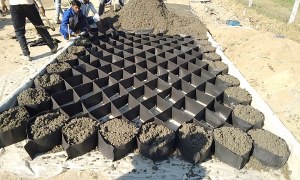🕑 Reading time: 1 minute
Rice husk ash (RHA) plays two roles in concrete constructions. The first role is using rice husk as a substitute for Portland cement which leads to the reduction of the cost of concrete, and the other role is as an admixture in the production of high strength concrete.
It should be known that, that type of rice husk ash used in concrete is amorphous, which is suitable for pozzolanic activity, not crystalline
There are many applications of rice husk ash in the construction such as high-performance concrete, insulation, green concrete, bathroom floors, industrial factory floorings, waterproofing and rehabilitation, and it is also used ceramic glaze and roofing shingles.
Contents:
Applications of Rice Husk Ash in Building Constructions
1. Low Cost Building Blocks
Ordinary Portland cement is expensive for undeveloped countries and the need for low cost building material is high. Due to the fact that cement is the most expensive component of concrete, replacing part of cement with rice husk ash would decline the cost of concrete greatly.
It is demonstrated that, replacing 50% cement with rice husk ash would reduce cost of concrete by 25%. An Indonesian company has used mix proportion of 10% cement, 50% aggregate and 40% RHA plus water to produce blocks. The average strength of the blocks was 12MPa.

2. Refractory Bricks
Rice husk ash has been used to produce refractory bricks due to its insulating properties. It can be used as an organic filler in refractory bricks where the organic matter is burned out during the firing to produce a lightweight porous product. Refractory bricks are used in furnaces which are exposed to extreme temperatures.

3. Lightweight Construction Materials
Higher strength concrete with RHA allows lighter weight products to be produced, such as hollow blocks with enhanced thermal insulation properties, which provide lighter walls for steel framed buildings.
It also leads to reduced quantities of cement and aggregate. Rice husk ash is used to produce lightweight insulating boards.
4. Insulating Material
It is used as a loose insulant in dwellings, farm structures and cold storage plants. If desired they can be flameproofed by soaking in a solution of boric acid and borax. Insulating value of rice hulls is quite high.

5. Soil Improvement
Rice husk ash in combination with small quantity of cement can be used for shallow stabilization.
6. Steel Industry
Rice husk ash is utilized in steel industry to produce high quality flat steel. The rice husk ash is used as insulator due to its desired characteristics such as low thermal conductivity, high melting point, low bulk density, and high porosity.
It is used to prevent rapid cooling of the steel and ensure uniform solidification. However, there are health concern regarding the use of rice husk ash in steel production because it oxides with elements in steel such as aluminum to form alumina (Al2O3).
Read More:
Rice Husk Ash in Concrete -Properties, Advantages and Uses in Construction
Characteristics of Rice Husk Ash Concrete – Workability, Strength and Admixtures


